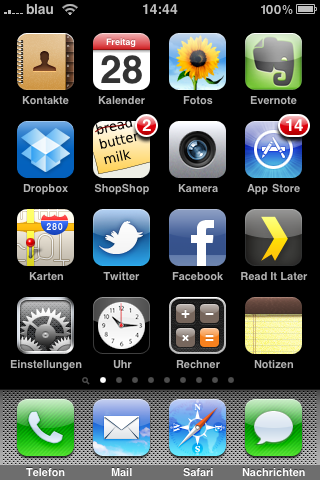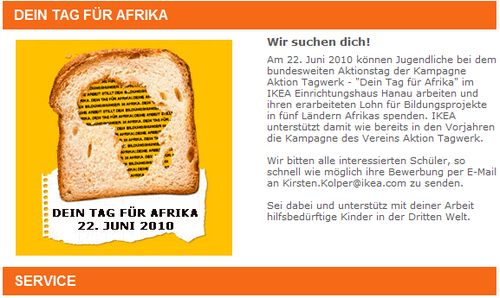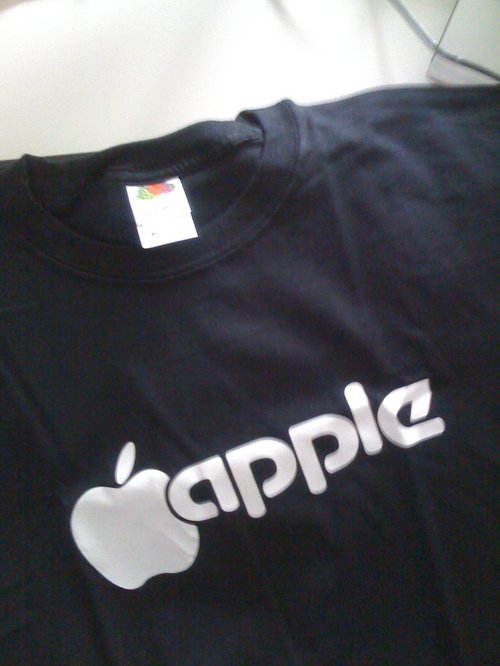Vor ein paar Tagen habe ich mein 3jähriges Jubiläum auf Twitter gefeiert. Auf den Tag genau mit @handelsblatt und @pottblog.
3 Jahre auf Twitter – mit nicht nur einem Konto – auf Twitter aktiv sein bedeutet vor allem eines: weg von der typisch deutschen Sichtweise, hin zu viel mehr Toleranz. Oder anders gesagt: wenn ich bei Twitter nur denjenigen folgen würde, die sinnvolle Tweets (so heißen die einzelnen Twitternachrichten für mich) absetzen, wäre ich wohl nicht so lange dabei – und vielleicht auch nicht so begeistert davon.
In diesen drei Jahren, in denen sich Twitter von der Nische hin zu einem halbwegs etablierten Tool gemausert hat, ist wirklich viel passiert. Meinen Umgang mit Twitter und was es für mich bedeutet habe ich hier in diesem Blog in der Vergangenheit schon öfter erwähnt, allerdings auf Englisch, und es ist eigentlich nur meiner Faulheit zu verschulden, dass einzelne Tweets bzw. Rückmeldungen via Twitter noch nicht in diesem Blog aufgelistet werden und gleichwertig zählen. Die Layoutvorlage meines Blogs stammt aus 2006, aber irgendwann demnächst werde ich dem allen mal Rechnung tragen und dieses private Blog so aufziehen wie ich es auch bei Kundenblogs mache.
Ebenso muss ich eingestehen, dass ich noch keine offizielle “Twitterpolicy”, also Vorgehensweise zum Umgang mit Twitter, verfasst habe. Bis aufs Meckern würde ich aber wohl dieser Bedienungsanleitung zustimmen und für mich übernehmen.
Beim Thema Twitter gibt es eigentlich so viel zu erwähnen, dass ich gar nicht wüsste, wo ich anfangen soll. Mittlerweile gibt es auch die verrücktesten Spinner auf Twitter – ganz schlimm finde ich die Marketingfuzzis und Twittercoaches, die mir automatisch folgen, weil sie irgendwo ein dämliches Tool dafür beauftragt haben. Ich sehe es da ähnlich wie dieser Nutzer in seinem Tweet:

Zwei Dinge aber möchte ich gerne festhalten, und diese sind auch der Grund für den Blogeintrag:
1. Ich habe oft den Eindruck, dass viele interessierte Internetbenutzer in Deutschland in Twitter nur eine reine Zeitverschwendung sehen, die ohne sinnvollen Output daherkommt und bestenfalls der leichten Unterhaltung dient.
Für diese Annahme muss ich nicht auf das aktuelle Beispiel von Herrn Grupp zurückgreifen, der als CEO von Trigema dieser Tage ein paar unglücklich gewählte Worte zum Thema Twitter gefunden hatte – und damit fast die gesamte deutschsprachige Twitterspähre gegen sich aufgebracht hatte.
Da ich Herrn Grupp bei der Nutec als sehr zuvorkommend erlebt hatte, der sich als Offliner seine E-Mails offenbar auch von seiner Sekretärin vorlegen lässt, stört mich so ein Kommentar eher weniger. Jedem seine Kernkompetenz.
Nein, vielmehr sind es die vielen anderen Twitter Benutzer, die dort angemeldet aber wenig aktiv sind. Die Teilnehmer der modernen Wissensgesellschaft, die über eine eigene E-Mail Adresse verfügen und es eigentlich besser wissen müssten. Gerade bei diesen Menschen bemerke ich oft eine gewisse Erwartungshaltung, ein Hoffen auf sinnvolle Beiträge.
Für diese Annahme muss man gar nicht zwischen den Zeilen lesen – der Unmut über die Fehlleistung von Twitter wird an verschiedenen Orten kund getan. Für mein Verständnis ist das eine typisch deutsche Eigenart – erstmal alles schlecht machen was man nicht gut findet. Dass man sich dadurch auch Chancen auf ein Weiterkommen verbaut, wird dabei scheinbar nicht bedacht.
Beim Bloggen auf AfriGadget.com habe ich gelernt, dass die amerikanische Sichtweise – erstmal alles toll finden – gar nicht so verkehrt ist. Dinge müssen nicht perfekt sein, müssen nicht 1A abgesichert sein damit sie funktionieren.
Genau aber dieses “perfekte” merke ich oft bei meinen Mitmenschen hier in Deutschland. Ich nehme mich da auch nicht aus und habe auch einen gewissen Perfektionismus in manchen (vor allem technischen) Dingen. Mit diesem Perfektionismus kommt man aber oft nicht weiter, oder ärgert sich gar.
Zurück zur Glaubensfrage und der Nutzung moderner Medien: Professor Peter Kruse hatte es ja letztens auf der re:publica 2010 so trefflich beschrieben: “Die Social Software des Web 2.0 ist ein Angriff auf die etablierten Regeln der Macht und erzwingt ein grundlegendes Umdenken.”
Eine Erkenntnis, die wir schon im März 2000 in der BrandEins zum Thema Cluetrain gelesen haben. Auch wenn es das Thema Web 2.0 damals in dieser Form noch nicht so gab.
Etabliert ist nämlich auch der – herkömmliche – Ansatz zu Wissen, das in der Vergangenheit in Büchern und anderen schlauen Medien zu finden war. Heutzutage aber, so empfinde ich es zumindest, lassen sich für mich brauchbare Infos auch über Twitter finden.
Oder anders gesagt: bei all dem digitalen Rauschen, das es in Twitter mitunter gibt, finde ich doch öfter die gewünschten Infos über social tools wie Twitter oder Delicious. Für mich ein nicht zu unterschätzender Nutzen und einer der Gründe, wieso ich selbst solches Wissen bei Twitter verbreite (hier: Erfahrungen mit Produkt A).
2. Das Cluetrain Manifest aus 1999 lehrt uns in seiner ersten These:
“Markets are conversations”.
Genau SO nehme ich Twitter wahr. Als öffentlicher Marktplatz, auf dem eben nicht nur (Wissen) gehandelt wird, sondern auch Neuigkeiten ausgetauscht werden.
Eigentlich sind das total banale Aussagen, aber man muss sie manchmal wiederholen, weil viele Menschen die Brücke zwischen der analogen und digitalen Welt nicht so wahrnehmen.
Ein gutes Beispiel hierfür sind die Nichtregierungsorganisationen, deren Antwortverhalten/Konversationsverhalten mein Kollege Christian Kreutz letztens in einem kleinen Praxistest untersucht hat.
Es stellte sich heraus, das die meisten großen Organisationen das Thema Twitter (oder auch Facebook/YouTube/etc., siehe hierzu auch die Studie von Katrin Kiefer) zwar irgendwie betreiben, es aber nur als weiteren Kanal verstehen, um einseitige Pressemitteilungen herauszuschicken. Dies mag sicherlich politische, personalpolitische, organisatorische oder finanzielle Gründe haben, aber es zeigt doch ganz eindeutig, dass das Thema Twitter & Co noch nicht überall angekommen ist.
Meine ehemaligen Kollegen bei der GTZ im Bereich der nachhaltigen Sanitärsysteme haben Twitter mittlerweile auch für sich entdeckt und auch recht schnell die Vor- und Nachteile von Twitter erkannt. Twitter ist zeitintensiv und bedarf einer gewissen Nachhaltigkeit, fördert auf der anderen Seiten aber auch Konversationen, die sonst vielleicht nicht möglich wären. Das ist ein Mehrwert, der von meinen Kollegen erkannt und nicht ausgeschlossen wird. Und das alles bei einem Thema, wo offen über Dinge wie Fäkalien und Urin diskutiert wird. Dinge, die bei vielen eher Unbehagen auslösen oder aus Desinteresse ignoriert werden. Müsste man man nicht gerade bei solch schwierigen Themen die Diskussion(en) via Twitter & Co herbeiführen?
Auf beiden Seiten des Rechners sitzen Menschen. Hört sich ziemlich banal an, ist aber entscheidend für Onlinekommunikation. Menschen, die man erreichen will. Oder vielleicht auch nicht.

Sprache ist nämlich auch so ein Thema. Ein gutes Beispiel sind für mich die Twitterlesungen, wo Tweets oft im gleichen Stil geschrieben worden sind. Müsst Ihr mal drauf achten. Ich nenne das die Berliner Coolness. Tweets, die für sich oder aufgezählt witzig und cool (“avantgardistisch”) klingen, im Gesamtbild aber – zumindest für mich – vor allem auch verdeutlichen, dass Twitter in diesen Tweets nur die “Twitter ist ein PA-System”-These darstellt.
Derek Sivers, von dem dieses “Twitter ist ein PA-System” kommt, schreibt auf seinem Blog allerdings auch:
“Deshalb habe ich zwei Profile auf Twitter und Facebook. Eines ist öffentlich, für jeden. Eines ist privat, nur für 20 enge Freunde. Ich empfehle das sehr.”
Wäre ich so berühmt wie er, würde ich es sicherlich ähnlich machen. In seinem Kontext ist Twitter also ein PA-System. Und weil ich seine Blogartikel oft interessant finde, klicke ich dann auch auf die Links in seinen Tweets. Was für ihn funktioniert, muss für andere aber noch lange nicht funktionieren. Wenn ich Derek erreichen will, schreibe ich ihm eine E-Mail.
Die Mareike (?) oben aus dem Screenshot, Psychologiestudentin hier in FFM, kenne ich nicht persönlich, finde ihre Tweets aber interessant & folge ihr bei Twitter. Gesprochen haben wir noch nie miteinander, was ich irgendwie etwas schade finde. Immerhin wohnen wir ja in der gleichen Stadt. Es ist eine einseitige Kommunikation. Aber dennoch: Kommunikation.
Auch so funktioniert also Twitter. Für viele mag das die Regel darstellen – dieses einseitige Absetzen von Meldungen ins Datennirwana. Für mich selber ist es eher die Ausnahme bei privaten Konten.

Um Kommunikation geht es mir auch beim Twitterkonto @afritwit (“pooling all African Twitter users”), bei dem ich vor allem Afrikabezogene Inhalte von anderen Twitterbenutzern aufgreife, wiedergebe und somit hoffentlich für ein besseres Verständnis des komplexen Kontinents Afrika beitrage – dem man mit so einem Twitterkonto natürlich niemals richtig gerecht werden kann. Aber dennoch, ein Ansatz, der auf eine ganz andere Zielgruppe abzielt und sich nicht nur aufs Wiedergeben von interessanten Tweets versteht (wohl aber, im Gegensatz zum privaten Konto, für diesen Zweck hauptsächlich benutzt wird). Ich erwähne dies hier nur als Beispiel, denn es ist in der Praxis ein riesiger Unterschied, ob man ein Twitterkonto, eine Facebookseite oder Youtubekanal privat oder für eine Mission betreibt.
Mission. Ich glaube mein persönlicher Grund, wieso ich Twitter seit diesen drei Jahren auf privater wie auch geschäftlicher Seite nutze, ist der, dass ich aus diesem ganzen digitalen Rauschen und den vielen, kleinen, oft zu kurzen Meldungen einen unheimlichen Mehrwert ziehe, den ich sonst nicht, oder nur eher umständlich bekommen würde. Dafür aber investiere ich auch ganz bewusst Zeit und Energie.
Ebenso “entfollowe” nicht gleich jedem Nutzer, der seinen Frust auf Twitter auslässt, weil mich seine Rechtschreibfehler nerven oder “ich diesen ganzen Müll lesen” muss. Insofern halte ich auch Dinge wie das Verhältnis “Following” zu “Followers” für nicht so wichtig. Mittlerweile gibt es ja eine ganze Industrie, die sich mit diesem Thema beschäftigt, rankings herausgibt und Twitter-Persönlichkeiten präsentiert. Für die Breitenwirkung mag das vielleicht relevant sein. Für mich nicht.
Daher meine Frage: nutzt Ihr Twitter, und wenn ja, wie? Comments, pls!




































 Most people will probably be too busy with their daily lives to reflect on the things they valued and explored in their youth, or maybe only buy a book that will tell them about the things they liked and that happened when they were young. You know, common values, childhood memories like what was shown on tv, aired on the radio or stuff you could buy back in those days. Or couldn’t.
Most people will probably be too busy with their daily lives to reflect on the things they valued and explored in their youth, or maybe only buy a book that will tell them about the things they liked and that happened when they were young. You know, common values, childhood memories like what was shown on tv, aired on the radio or stuff you could buy back in those days. Or couldn’t.